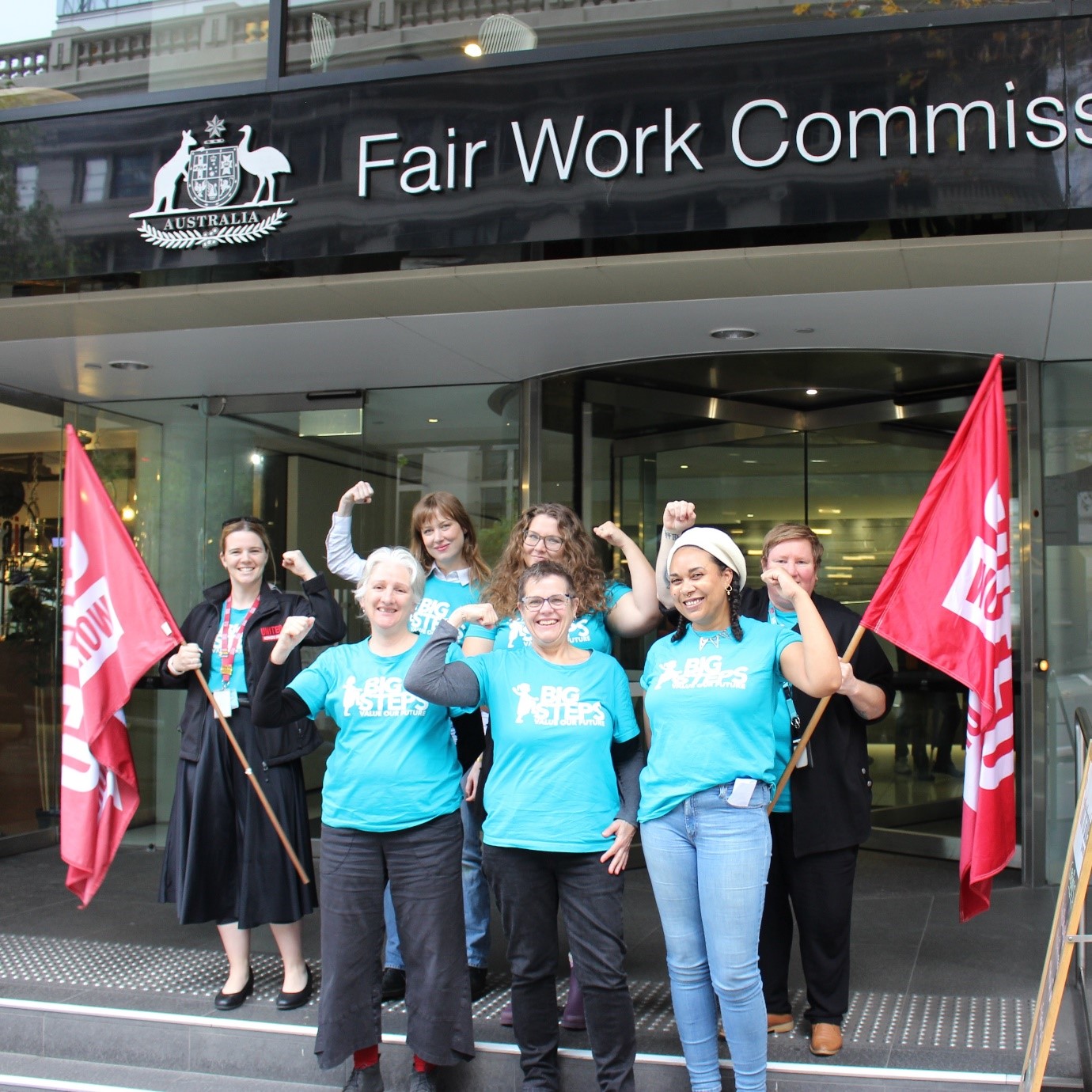Annual wage review reveals declining living standards of the working class - sets the scene for big struggles ahead
Written by: Ned K. on 10 June 2023
(Above: June 6 – Early childhood workers, members of the United Workers Union, are the first to apply for multi-employer bargaining at the Fair Work Commission. Photo: UWU Twitter)
The Decision of the Full Bench of the Fair Work Commission is worth reading for the information it provides on the impact of the anarchy of the capitalist economy on the living standards of working class people.
Despite the 5.75% increase to pay rates in Awards, the Decision concludes, "Real wages have been in decline since the middle of 2020 and are forecast to fall further this calendar year, before slowly beginning to recover in 2024"
The lowest paid workers on Awards have "seen their wages rise by 7.8% since 2020 if working full time...or by 7.2% if on a higher Award classification rate. It is well established that National Minimum Wage and modern award-reliant workers spend a higher proportion of their income on goods and services such as food, housing, energy and healthcare. Prices for these non-discretionary items have risen faster than the 15.9% increase in prices as a whole since June 2020."
Some people may shrug this trend off, assuming that most workers are employed under above-Award collective agreements. The Annual Wage Review Decision includes "Method of Setting Pay" data. This shows that since 2012 there has been a decline in the percentage of the working class paid under collective agreements, an increase in the percentage paid under the minimum Award rates, and no change in the percentage paid under "individual arrangements".
In 2012 there were 16.1% paid under Awards, 42% under collective agreements and 41.9 % under individual arrangements.
In 2021, there were 23% paid under Awards, 35.1 % under collective agreements, and 41.9% under individual arrangements.
While many of those under "individual arrangements" include higher paid sections of the working class including the mining and resource industry, it also includes an underclass of workers paid less than the Award under the guise of individual contractors which, when examined, are nothing but a wage swindle to avoid minimum Award entitlements.
Under pressure from the organized working class and their allies, the Labor Party has introduced multi-employer collective agreement making into the Fair Work Act. This new legislation gives the appearance of providing workers on an industry basis to unite across employers to improve living standards. However, there are many hoops for the unions to jump through and loopholes for employers to frustrate workers’ hopes of gaining lost ground.
As throughout the history of capitalism, where workers unite in determined struggle under progressive leaders from their ranks, they will force concessions from the big capitalists in particular.
One of the first group of workers to test out the new multi-employer collective agreement provisions of the Fair Work Act is Early Childhood Education workers. This sector consists of mainly women workers who have developed a strong collective culture. They will be determined to show that women workers hold up half the sky for the working class as a whole when it comes to the question of wages vs profits’ share and the struggle against the tendency of capitalism to impoverish the working class.
Print Version - new window Email article
-----
Go back
Independence from Imperialism
People's Rights & Liberties
Community and Environment
Marxism Today
International
Articles
| A workers’ party of a new type |
| Honour the Past, Fight for the Future |
| Swissport CEO shows contempt for workers |
| ACOSS survey and the need for a revolutionary class analysis |
| Rail workers strike for a living wage |
| Profits before People |
| Ants and Elephants: Middle Class relations with the Imperialist Bourgeoisie and the Working class |
| Aged Care Workers Win Higher Wages and Some Respect |
| Party Anniversary and Congress |
| Rising Tide Lifts All Boats |
| Closing loopholes or creating new ones? |
| The Factors of Production in Contemporary Australia |
| Pilbara Train Drivers Take industrial Action Against BHP |
| Book review - Missing the point: Alison Pennington's "Gen F'D" |
| Bosses still out to undermine Awards in changing workforce |
| Strength In Diversity - The Australian Working Class |
| Call to support US Auto Workers' Strike |
| When Workers Unite, Bosses Tremble! |
| Wage thieves don’t like new legislation |
| Working together "for the nation" is a class question |
-----

